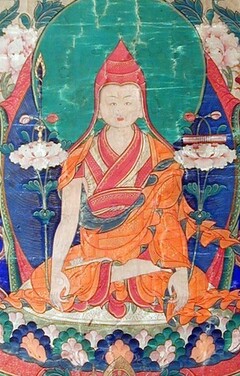Disheartened by Circumstances
Disheartened by Circumstances[1]
An Acrostic Poem
by Longchen Rabjam
Oṃ svasti siddhaṃ!
Those who rely on you gain the treasury of complete liberation;
You are the basis upon which perfect knowledge and freedom arise,
The only true friends who bring virtue and goodness to all beings—
Supreme saṅgha assembly, kindly lend your ears to a few verses.
Akin to rākṣasa demons roaming through Kaliṅka’s lands,
Bandits in the Land of Snows are these Khampa tribes,
Causing mayhem in the towns and places they frequent,
Desirous and aggressive swaggerers—have you seen them?
Excitable and raucous by nature, these bands of Khampas,
Flying about the ten directions, forever on the move,[2]
Guzzling tea and alchohol and slaughtering creatures,
Having the lifestyle of fishermen—have you seen them?
Imitating tigers or leopards prowling through palm groves,
Joyfully frequenting squalid taverns and dens of thieves,
Knocking back lizard concoctions, inflamed by passion,
Lusting after youthful maidens—have you seen them?
Malodorous as a garden filled with rotten vegetables,[3]
Noxious with the stench of alcohol, garlic and onions,
Oblivious as cattle as to what is clean and unclean,
Poor mannered Khampa beasts—have you seen them?
Quick to take flight the very moment conflict arises,
Retreating like nocturnal creatures touched by warming rays.
Similar to those in the petty kingdom of Jaradangra,[4]
They who flee just like foxes—have you seen them?
Uselessly wearing helmets even in innocuous places,
Violently assaulting residents to satisfy their appetites.[5]
While even openly admitting, "We are without shame."
Extraordinary, these uncouth Khampas—have you seen them?
Yearning to slaughter goats, sheep, oxen and other beasts,
Zooming over passes, through rivers and ravines to ransack villages—
Ah, just look at them, these meat-eating, alcohol-guzzling womanizers!
Have you seen them, these plunderers of the teachings in this world?
Such fatally absurd and egregious ways constitute a form of
Study, contemplation and meditation for our Khampa brethren!
These verses based on the thirty letters of the alphabet
I affixed at the crossroads when driven from my residence.
Ngakgi Wangpo of Samye composed this at Sangphu Neuthog. May it become a cause for virtue and excellence to abound!
| Translated (with prosaic licence) by Adam Pearcey, 2022.[6]
Bibliography
Tibetan Edition
dri med 'od zer. "rkyen la khams 'dus ka kha sum cu/" in gsung thor bu/_dri med 'od zer/(sde dge par ma/). 2 vols. Paro, Bhutan: Lama Ngodrup and Sherab Drimey, 1982. Vol. 1: 211–212
Secondary Sources
Arguillère, Stéphane. Profusion de la vaste sphere: Klong-chen rab-’byams (Tibet, 1308–1364). Sa vie, son œuvre, sa doctrine. Leuven: Peeters Publishers, 2007.
Tsumagari, Shinichi. Meaningful to Behold: A Critical Edition and Annotated Translation of Longchenpa’s Biography. Create Space, 2016.
Van Schaik, Sam. "The Brilliant Scholar and the Scurrilous Letter" Early Tibet, accessed January 12, 2022 https://earlytibet.com/2010/05/25/longchenpa-and-the-scurrilous-letter/
Version: 2.1-20230714
-
Note that this is a counterpart to another poem called Disheartened by Causes: With a Garland of Flowers" (rgyu la khams 'dus pa me tog gi phreng ldan), which precedes it in the Miscellaneous Writings (gsung thor bu) collection, and the title must be understood in that context. The title is also a play on words, as the term translated here as "disheartened" (khams 'dus pa), which can signify ill health, uneasiness, irritation or even congestion, includes the word for Kham (khams). ↩
-
The term cha’o here is obscure, and the translation is therefore tentative—even more so than with the other lines. ↩
-
pa nas could also refer to a form of barley. ↩
-
The reference is obscure. ↩
-
The Tibetan here contains the ambiguous term za ma, which could mean food or women, hence the translation "appetite", which is similarly ambiguous. ↩
-
The translation was produced with the kind assistance of Alak Zenkar Rinpoche, but the translator bears sole responsibility for any errors. ↩
